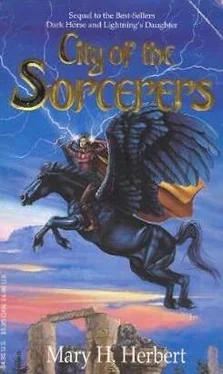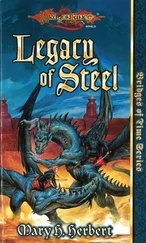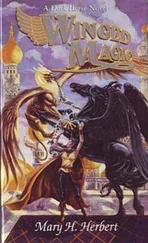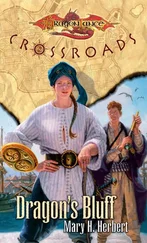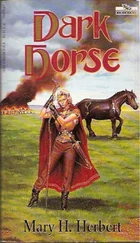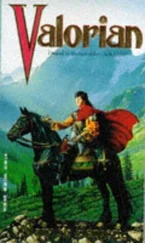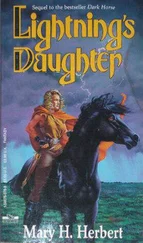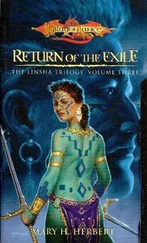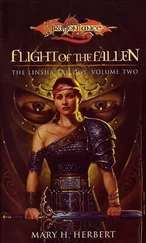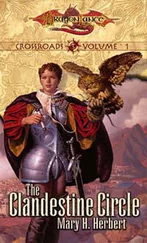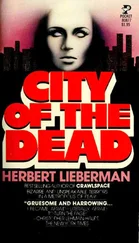“She had no business being on him,” answered the chieftain, a father’s frustration plain in his voice. “She was lucky that only her foot was crushed.”
Gabria laid her hand on her husband’s arm. “Give her time. She will learn in her own way.”
“Perhaps,” Athlone said. “But in the meantime we could certainly use her help!”
“I’ll help, Papa!” Coren piped up with all the enthusiasm of a ten-year-old trying to outshine an older sister.
“You know, I think you could,” Gabria replied, bending down to his level. “I want to visit a boy about your age. His name is Bennon. Would you like to come and talk to him?”
“Can he wield magic, too?”
“I think so.”
“Good! I’ve got lots of spells I can show him!” Coren announced proudly.
Sayyed grinned, his teeth shining white against the black of his neatly trimmed beard. “Take Nara. She always impresses the children.” Coren matched his grin. “Could we, Mamma?”
As an answer, Gabria blew a sharp, piercing whistle that cut over the noises of the busy council grove. The men by the chieftains’ tent looked up at the sound and turned their heads again when the call was answered by a distant neigh. From the far fields, where the clans’ horses grazed, a black form cantered over the grassy valley floor—Nara, Gabria’s Hunnuli mare.
Unlike the clan-bred Harachan horses, which were the pride and livelihood of the semi-nomadic clans, the Hunnuli were a breed of legend. Descended from a single stallion blessed by the clans’ goddess, Amara, the Hunnuli had greater intelligence, strength, size, and longevity than any other horse. Originally bred to be the mounts of clan magic-wielders, they were endowed with the ability to communicate telepathically with the clanspeople who had the inherent talent to use magic. After the fall of Moy Tura, city of the sorcerers, and the slaughter of the magic-wielders that followed, the Hunnuli slipped into obscurity and almost died out. Then, two hundred years later, Gabria found a Hunnuli mare, Nara, trapped in a mudhole. She saved the horse’s life, thus forging a friendship that had remained inviolable.
With that friendship came a renewed understanding of the Hunnuli horse and its purpose within the clans. It was partly because of the people’s awe and respect for the Hunnuli that they learned to accept Gabria’s power to use magic. Since that time, the numbers of magic-wielders and Hunnuli in the clans had slowly increased to about thirty each, and the admiration for the fabulous horses had continued unabated.
Even now, eyes were turning to watch Nara as she galloped past the Khulinin camp and swept into the shady council grove. Like every Hunnuli, the mare was ebony black with a white mark, in the shape of a jagged lightning bolt, on her right shoulder. Her thick mane and tail flew like black smoke as her long, powerful legs carried her easily over the ground. She stopped neatly in front of Gabria and nickered a greeting.
Gabria mounted and settled happily on the mare’s warm back. She always felt safe and comforted in her old friend’s presence. The prospect of a gallop to the Reidhar camp drove the confusing shadows of her vision to the back of her mind. She would probably learn soon enough what had caused that strange episode, but in the meantime she could do something she enjoyed—share her love of magic with children.
“Come on.” She smiled to her son and held out her hand.
Coren whooped in delight and bounced up onto Nara’s back in front of his mother. With a wave to the two men, Gabria and Coren rode off to visit the Reidhar clan.
For the third time in as many minutes, Kelene gritted her teeth and tightened her knees as her gelding vented his feelings in a bad-tempered hop and a buck. Head lowered, back arched, the horse barged around the starting line while the other riders cursed and kept out of his way. The gelding was feeling murderous—Kelene could sense it in every stiff jolt of his body.
Of course, that was nothing new for Ishtak. The gelding was a stone-gray Harachan, as hard, bleak, and difficult as a rock cliff. A more bad-tempered animal Kelene had never seen. She knew he tolerated her only when he felt like it, and she also knew he would dump her at the first opportunity. Yet she had chosen him, learned his moody ways, and put up with his ugly temper for one reason: the horse could race. When he channeled his anger into competition, he was as surefooted as a goat and as fleet as the wind. Few Harachan horses could beat him.
The trick was to stay with him long enough to get him started. For Kelene that was sometimes tricky. Unlike the other riders, she had no saddle or stirrups, only a saddle pad strapped to Ishtak’s back. She had learned the hard way that her crippled foot and ankle were too weak to bear her weight in a stirrup or remain in a bent position. The pain had finally forced her to ride bareback and to develop the balance, strength, and firm seat needed to help her control a recalcitrant horse.
She had learned too, that the usual women’s skirts were a hazard on a cross-country race. Today she wore the special split-legged skirt her mother had made for her, a gold tunic, and soft boots. Her thick, dark hair was braided and coiled on the back of her head.
The girl cursed as the gelding crow-hopped out of line again, jarring her teeth. There was no way to cajole this foul tempered beast with soothing words, encouraging pats, or treats. Nothing pleased him except getting the best of his rider or winning a race—whichever came first. Kelene pulled his head up and forced him back into the milling line of riders waiting for the start of the race. Just another moment or two and they would be away.
Twenty-five other horses waited with Ishtak, some of them prancing with excitement, some of them quiet and unimpressed by the crowds, the noise, and the mounting anticipation. There were no Hunnuli in line since the race was no contest to the big blacks, but some of the finest Harachan horses on the plains were there to represent the different clans. Dust billowed up under their stamping hooves, and the clan colors on the riders’ tunics gleamed in the morning sun.
It was a perfect day for the Induran race: clear, warm, and dry—a typical summer morning. The sky arched over the river valley in a flawless dome of blue; a light breeze stirred the grass. The bazaar and the camps were quiet that morning and the council grove was empty. Everyone had gone to the flats to see the start of the most important race of the gathering.
The Induran was a cross-country endurance race that tested the stamina, skill, and courage of horses and riders alike. There were very few rules, and the race was open to anyone with the desire and the horse to ride. The fact that women rarely rode in the rough-and-tumble race was only an added challenge to Kelene. The year before she had entered and ridden well only to lose her favorite mare when the animal stepped in a hole and shattered its leg a league before the finish line. This year Kelene had Ishtak and was more determined than ever to win.
The girl glanced toward the starter on her right, but he had made no move to raise his horn. He was still waiting for last minute entries. Someone several horses away caught her eye: a slim, young man on a chestnut horse. He grinned mockingly at her and waved. Rafnir, Sayyed and Tam’s only son, was as fine a rider as the clans had ever produced and one of the few serious contenders who could beat Kelene in this race.
Rafnir was laughing at Ishtak’s tantrums, but Kelene refused to give him the satisfaction of a response. Instead, she concentrated on the open stretch of land in front of them.
From the corner of her eye she saw the starter raise his horn. The twenty-six horses were abreast of one another and the riders were ready. The crowd roared with excitement.
Читать дальше
